In search of better returns and bullish on futuristic trends, an increasing number of VCs, among other investors, are now shifting their focus to theme-based investing, tweaking their investment strategies
Compared to a decade ago, VCs now see value in focussing on one particular sector and curating their entire portfolio around it, allowing them to offer better support to their portfolio startups in terms of networking capabilities, expertise, and follow-on investments
Inc42 analysis reveals that a large number of investors will emerge from India’s founder community in the near future, aiding the rise of thematic funds in India
In the last few years, challenges like falling returns on investments, volatile public markets, broken supply chains, constantly rising interest rates, and weakening of the INR against the USD have dented the investment sentiment in the world’s third-largest startup ecosystem, India. However, as the world is quickly adapting to this new normal, so are venture capitalists (VCs).
In search of better returns and drenching with the enthusiasm to bet on futuristic trends, an increasing number of VCs, and many other investors, are now shifting their focus to theme-based investing, tweaking their investment strategies.
Theme-based or thematic investing includes investments in diverse themes and companies operating in a specific sector, including its sub-sectors, with a pool of funds dedicated specifically to them. These funds are floated with the primary objective of tapping into futuristic trends early and leveraging LPs’ expertise in a sector to attract quality startup deals.
Some examples of theme-based VC funds are B Capital (Healthcare Fund I), a $500 Mn fund focussed entirely on the healthcare industry; AdvantEdge (Fund III), a $100 Mn fund focussed on electric vehicles (EVs); and Capital A’s MV Core Tech Fund–I, a $419 Mn fund for ventures operating in the deeptech space.
According to an Inc42 analysis, more than 220 new startup funds were announced with an approximately $30 Bn+ fund corpus between January 2021 and May 2023. Of these, 35%-plus (77 funds) were thematic or theme-based, lapping up a fund corpus of more than $5.6 Bn. Additionally, of these 77 thematic funds, around 57% of funds were floated by VCs.
Further, these thematic funds were launched across 20-plus sectors and sub-sectors with a focus on pre seed to late stage investments.
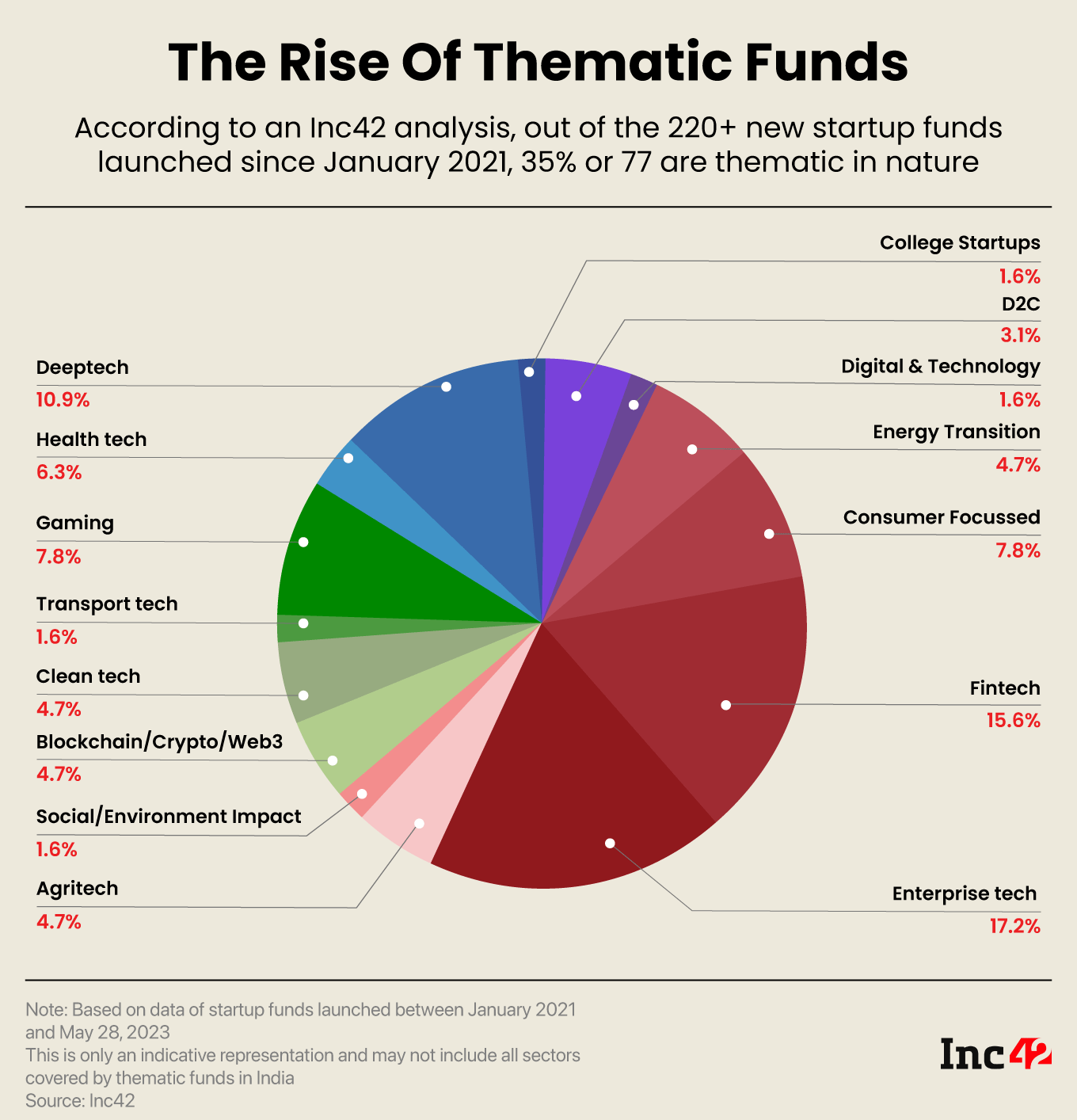
Why Is The Thematic Fund Wave Rising In India?
The rising interest of investors in thematic funds is directly proportional to the growth of the Indian startup ecosystem and the number of startups that are mushrooming in the country across diverse sectors and subsectors. This maturity has also led to the creation of newer niche segments, which promise high growth potential.
According to Inc42’s latest report on India’s Startup Investor Landscape, the total number of tech startups in India will grow 60% from 65K in 2023 to 104K in 2030. Further, the startup ecosystem has matured during this time and now fosters 108 unicorns, 100-plus soonicorns and 14 tech companies that are listed on Indian stock exchanges. In addition, the startup investor ecosystem in India is pegged to become 40K strong by 2030 from the current 11K.
Also, as markets mature, VCs get the opportunity to either float geography-focussed funds with more focus on the total addressable market (TAM) and the scale a sector can offer, or thematic funds that tend to be smaller in size and focussed on a specific sector regardless of TAM.
“We have seen this play out in the US, Europe, and Israel. The trend is now catching up in India,” said Vishesh Rajaram, managing partner, Speciale Invest.
For example, in 2021, 13% of all European venture funding went towards climate tech startups, and 70% of this capital came from local investors in the region.
Apart from this, three other key reasons are bolstering the rise of thematic funds in India. These are as follows:
Evolving Investment Strategies
VCs today are spoiled for choices due to the increasing number of startup bets in the country. Further, many investors have now started to tweak their investment strategies, which were earlier structured around fund diversification or their respective investment thesis.
Compared to a decade ago, VCs now see value in focussing on one particular sector and curating their entire portfolio around it. This allows them to offer better support to their portfolio startups in terms of networking capabilities, expertise, and follow-on investments, just to name a few.
“Sector agnostic funds may not offer this leverage to startups. Thematic VC funds offer a more patient capital and allow startups to emerge as category leaders,” said Shoeb Ali, cofounder and managing partner, Transition VC, an energy transition focussed VC fund.
The Emergence Of Micro VC Funds
The concept of micro VCs has recently gained prominence with VCs signing cheques in the range of $100K and $500K to support pre seed to Pre-Series A startups. This has allowed investors to identify synergies and test the waters in the segments of their expertise, thus boosting the thematic funding strategy.
For example, Speciale Invest, known as a spacetech or climate tech fund, largely caters to the deeptech segment with space, climate, semiconductor, and robotics being its major sub-sectors.
Its first micro VC fund of INR 60 Cr ($7.2 Mn) was launched in 2018 through which it backed 18 companies with an average deal size of around $500K and scored three early exits.
The company announced the second fund in April 2021, which closed at INR 286 Cr ($34.6 Mn). It plans to invest in more than 20 early stage companies through pre seed and seed funding rounds.
A Rise In The Number Of Investors
Inc42 analysis reveals that a large number of investors will emerge from India’s founder community in the near future. This will further aid the rise of thematic funds in India.
Some of the recently launched thematic funds by Indian founders are:
- Pine Labs’ Amrish Rau and Jupiter’s Jitendra Gupta floated a $40 Mn VC fund, White Venture Capital with a focus on fintech and consumer tech.
- Sports tech startup Dream Sports — the parent company of fantasy sports unicorn Dream11 — launched its investment arm Dream Capital with a $250 Mn fund corpus with a focus on the sports ecosystem.
- Freshworks’ Girish Mathrubootham, Eka Software’s Manav Garg, along with few others launched Together Fund with a corpus of $85 Mn with a focus on enterprise tech and the list goes on.
According to Mark Kahn, the managing partner at Omnivore, “Such thematic funds are able to offer startups advice and support rooted in deep sectoral knowledge, which ultimately creates more value than what generalist VCs bring to the table.”
Decoding The Thematic Funding Landscape In India
India’s thematic funds’ landscape can primarily be divided with respect to their focus on sector, stage, impact created, age or gender. These are some of the key investment themes observed in the last three years where investors have been putting the impetus on. Such funds may follow one theme or a mix of themes depending on their investment thesis.
For instance, Fireside Ventures launched a $118 Mn fund in 2021 with a focus on consumer tech startups but limited to early stage deals. Similarly, Avatar Growth Capital is another $100 Mn fund that invests in enterprise tech startups but only at the growth stage.
Also, there are funds like Grad Capital, which are sector agnostic but focus only on startups from college entrepreneurs.
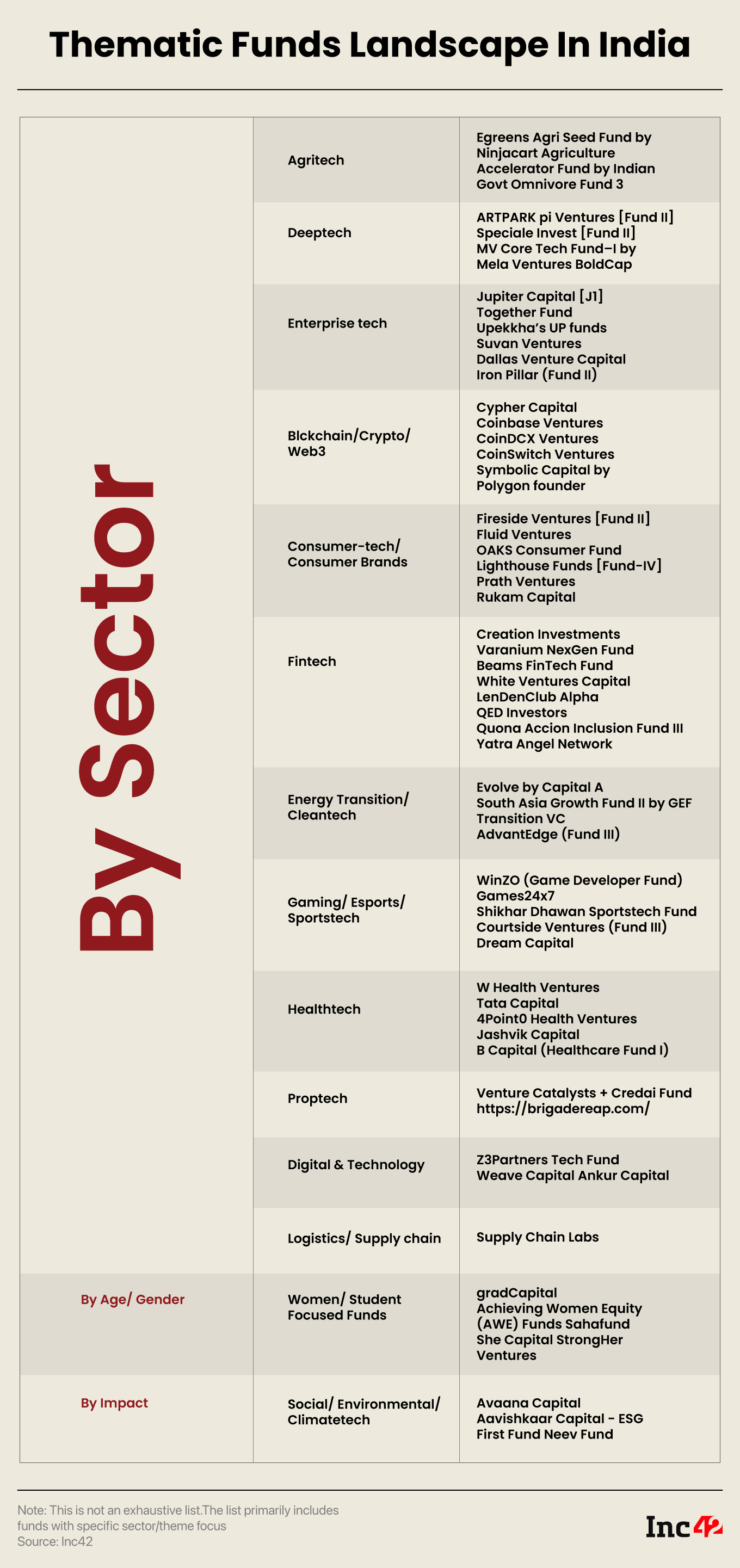
How Thematic Funds Are Creating A Differentiation In The Market?
The overall objective of thematic funds is very similar to regular funds in terms of fund structure, tenure and cycle. However, Transition VC’s Ali emphasises that thematic funds support startups in many more ways than a typical VC fund.
“For example, we have helped our startups refine the product, develop the product roadmap, connect with pilot customers, and set up the supply chain and enable go-to-market decisions. This vertical focus has created a lot of learnings for the fund, and we share these insights with the startups resulting in accelerated growth,” he added.
Further, thematic funds can also vary in terms of ticket sizes, support to startups, the impact created, and exit opportunities.
For example, the healthcare-focussed thematic fund W Health Ventures’ objective is to positively impact 100 Mn Indians. It also aims to identify large clinical ‘white spaces’ in India that can be transformed by learning from and contextualising global advances in clinical models, technology, patient experience, or distribution/business model.
“Thematic funds typically chase a goal beyond standard IRR (internal rate of return) expectations,” said Namit Chugh, investment lead, W Health Ventures.
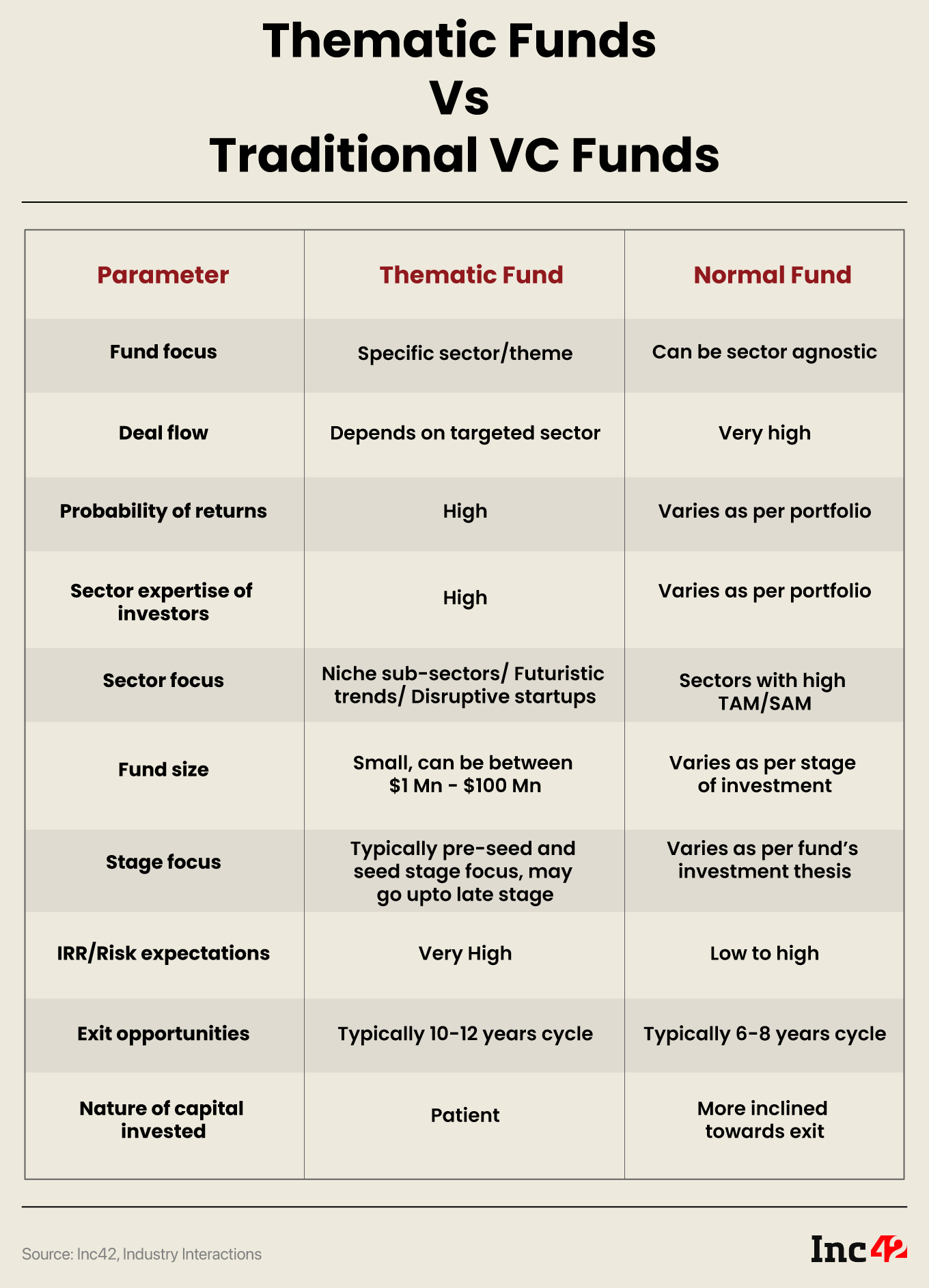
The Art Of Targeting The Right Themes
Most thematic funds are focussed on the future trends or themes of tomorrow, which may be highly dynamic in nature.
In one of the blog posts BlackRock Capital explains, “At one end of the spectrum, we have structural megatrends expected to shape the long-term trajectory of the economy like technological innovation, demographic shifts, and climate change. At the other end, we have evolving short-term trends driven by policy shifts, investor sentiment, and unforeseen developments — like a global pandemic, supply chain challenges, and inflationary pressures.”
These shifts point to growing opportunities, and fund managers may find themselves under a lot of pressure to ‘bet’ on the right theme. Further, they may also see themselves facing fears of missing out on essential bets. However, this could take them to uncharted territories and risk their overall fund performance.
Therefore, it has become more crucial than ever for VCs to choose the right theme or sector.
Although there are multiple tools and techniques at the disposal of analysts and researchers to understand the ongoing trends and predict future ones, it has become imperative for VCs to trust their experience to align with newer niches and investment prospects, which are growing by leaps and bounds.
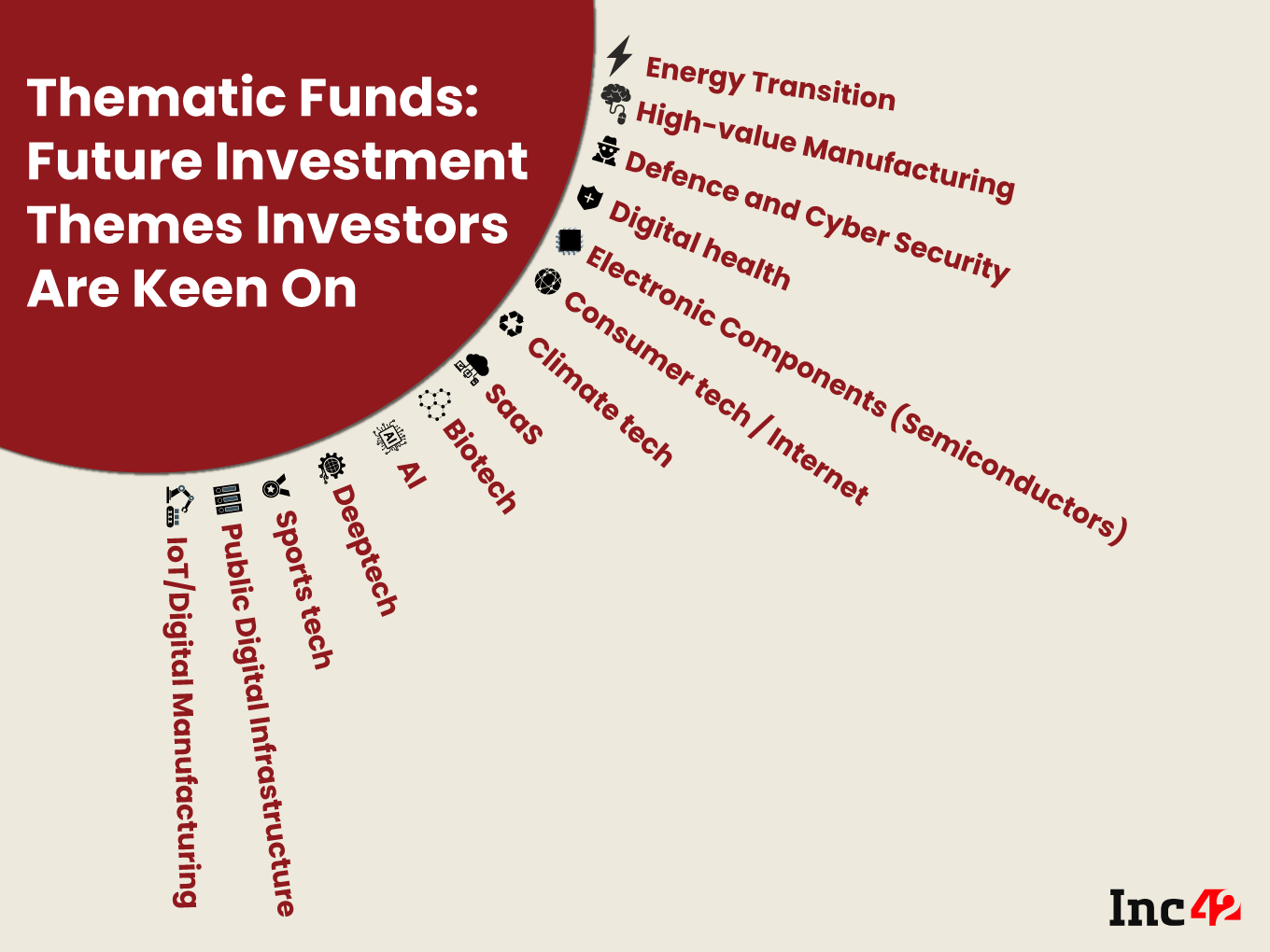
A Win-Win For LPs
Thematic funds typically attract limited partners (LPs) such as ultra HNIs, family offices, corporates, and others, who know the sector and its growth potential well. As operators and business owners, they have seen the disruption within specific sectors because of technology and recognise the opportunity for value creation by investing in startups through thematic funds.
In other words, such LPs are realising that investing through thematic funds can create win-win opportunities, i.e., actual returns on their investments as well as growth for their own respective businesses.
Such LPs are no longer restricted to investing in private equity players that backed traditional industry, as was the case, maybe, a decade ago. The exponential growth in startup funding in India and its potential to deliver high returns to LPs has made VC investments equally attractive.
India is today well known as a product nation and making products for the world, so the startup opportunity is clear and well-defined now than a decade ago, which has given thematic funds a significant boost.
According to deeptech-focussed Speciale Invest’s Rajaram, the firm’s LPs use specialised funds to diversify capital allocation even within the startup investment portfolio. This gives LPs specific theme exposure and access to larger funds. “In our view, the LPs’ need to diversify capital allocation is increasing allocation for thematic funds and India-specific funds,” he added.
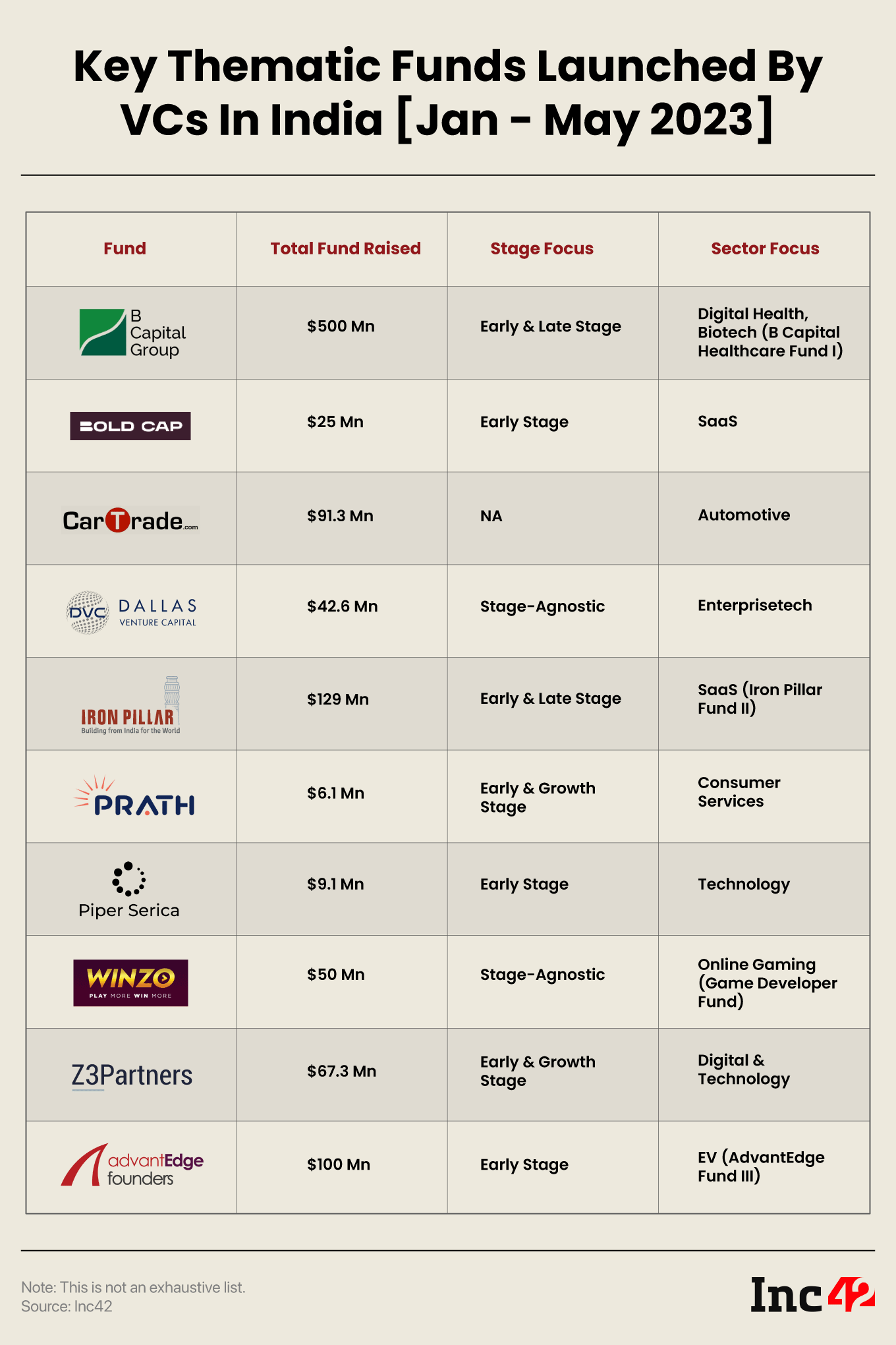
Thematic Funds: Outlook 2023
Overall, the VCs Inc42 spoke with believe that there will be more thematic fund launches in India, and they will definitely grow in size as niche sectors evolve and increase their serviceable addressable market (SAM).
As Transition VC’s Ali highlighted earlier as well, with the availability of risk capital, entrepreneurs will try to solve more complex problems. The specialised funds backing these high-risk and high-return startups will initially attract a lot of interest from generalist or late stage funds, resulting in huge value creation.
Consider this: Indian energy consumption in the following decades will increase at a CAGR of 9%, and most of it will be clean/renewable energy.
“This shift towards cleaner energy will result in enormous disruption and massive value creation by startups in this segment. With new energy, Indian companies can replace fuel imports, simultaneously leveraging internal resources of the country and transforming themselves into net exporters of new energy,” he added.
VCs engaged in thematic funds will focus more on early stage rounds (seed/Series A) going forward. This will initiate collaborations with venture studios, incubators, and the founder ecosystem to help them gain access to quality early stage startup deals.
As of now, existing thematic funds, buoyed from their early success, will continue to raise larger thematic funds for both early and late stage opportunities.
“Although there are no specified numbers here, as the Indian economy grows larger, the ecosystem will need specialised funds to create value and generate alpha returns for investors,” said Chugh of W health Ventures.
While this is just one side of the story, the country’s investor ecosystem seems to be betting big on thematic or specialised funds, paving the way for new-age entrepreneurs to solve the real problems of the world using technology.
[Edited by Shishir Parasher]
Updated on June 13, 2023
Note: A comment from one of the investors has been removed.












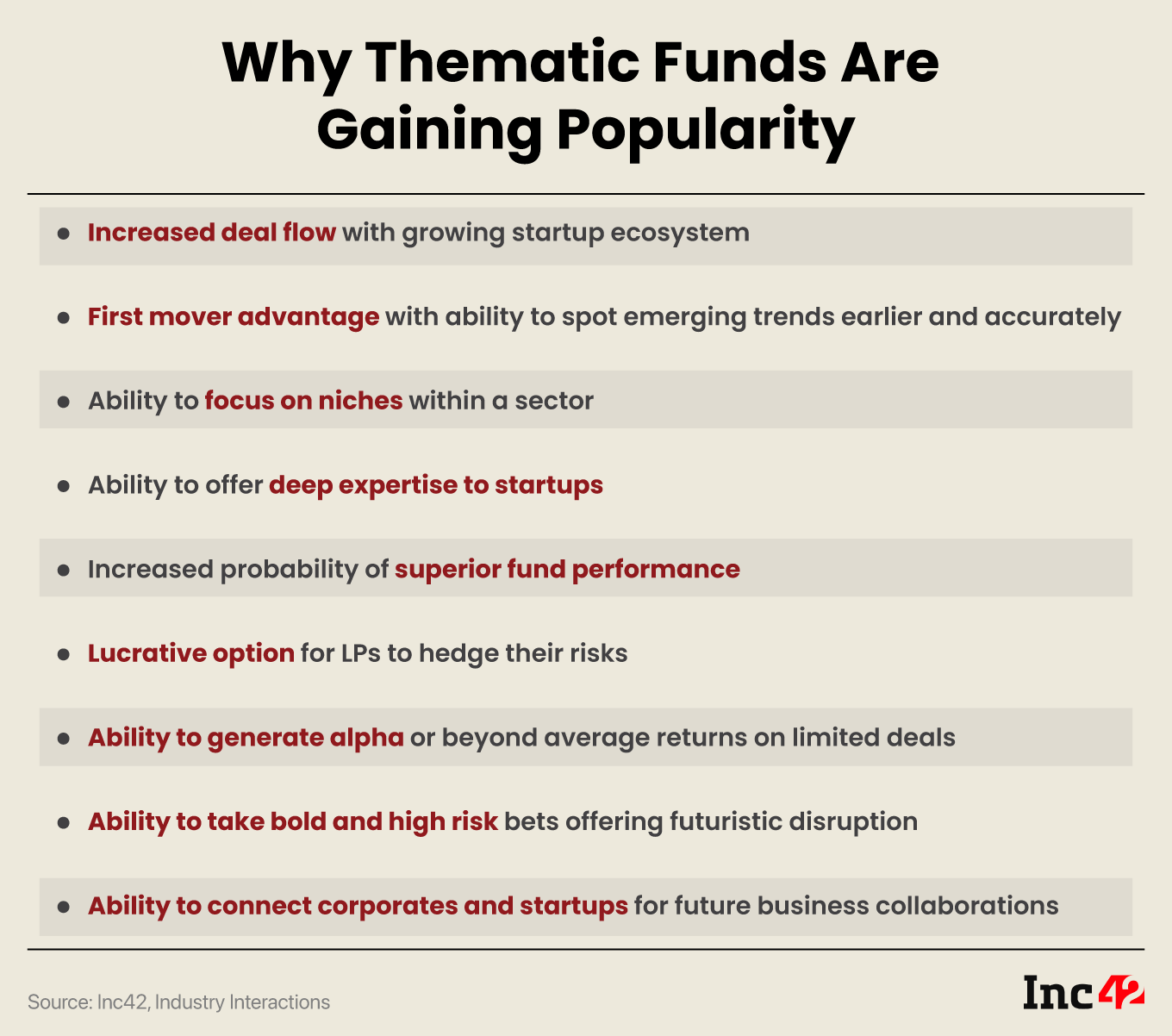




















 Ad-lite browsing experience
Ad-lite browsing experience